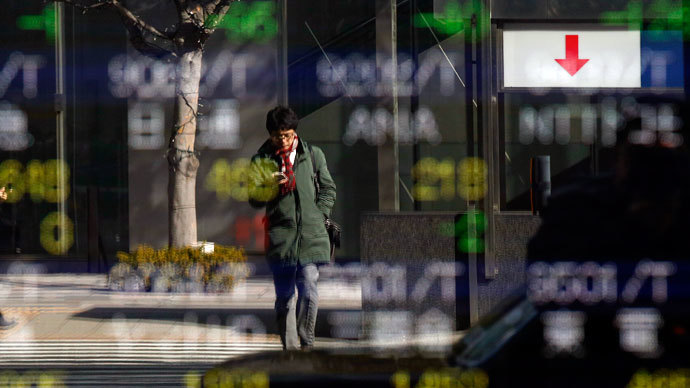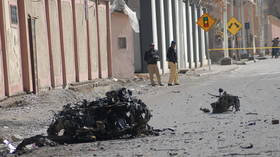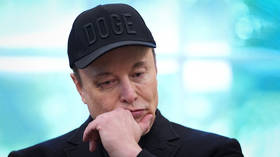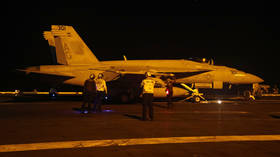Why Japan is dreaming of 1914

The Masters of the Universe who have just been to their annual bash at Davos would never dare executing radical maneuvers such as those performed in parallel by young skiers and snowboarders at the X Games in Aspen, Colorado.
But they could always dream of being young and fit – and defying gravity.
Yet as the dream rolled on, they could not come up with anything apart from remixing a historical nightmare. Thus emerged the top meme at Davos: that 2014 is the new 1914.
Let’s take a quick look at the context. We should need no reminding that the Masters of the Universe have recently presented the world with a financial/economic disaster much more profound than the Great Depression.
In the exceptional Homeland itself, over 90 percent of so-called “new jobs” are mere temps (paltry wages, no benefits, no job security). Major insolvent banks are being kept one step away from coma by a “healthy” infusion of at least $85 billion a month from US taxpayers. The US middle class is being exterminated with relish.
As for the EU’s economy - except Germany – it is in an absolutely precarious state, even as French President Francois Hollande is convinced that more Gallic muscle display from Northern Africa to the Middle East is a worthy solution; oh yes, that and getting rid of Valerie so he may keep his scooter love story with Julie.
Then there’s the ongoing US/NATO/GCC war that spans every latitude from the Maghreb, West-Central Africa and the Horn of Africa through the Middle East, the Persian Gulf, the Caucasus and all the way to the South China Sea. Call it the “birth pangs” of the much-mythologized American exceptionalist “pivoting to Asia.”
In a subplot of the war, the axis of hate – the House of Saud and Israel – remains on overdrive, scotching any possibility of a deal between Iran and the P5+1, something that prompted US Secretary of State John Kerry to enter deep damage control territory when accused at Davos by wily Saudi Prince Turki al-Faisal – a former illustrious pal of Osama bin Laden – that the US is “retreating from its responsibilities” in the Middle East.

“Responsibilities,” of course, is shorthand for fighting Tehran, Damascus and Hezbollah by all means necessary – including Bandar Bush’s army of mercenary goons - to the benefit of those glorious 7th century democrats in Riyadh.
Yet petrodollar pressure does produce dividends; the new mantra by Obama administration minions is “a rolling series of extensions” for the deal between the P5+1 and Iran. That is 180 degrees opposite to what they had agreed to; a final nuclear deal six months after the start of the implementation of the current interim deal.
Banzai time?
And then, right into this turbulence, steps Japan.
I have examined here how Japanese Prime Minister Shinzo Abe, in a keynote speech to the Masters of the Universe crowd of billionaires, bankers, CEOs and politicos at Davos, went from his “Abenomics” mish-mash to basically demonizing China as the prime instigator of a new 1914.
Abe said that the “world” – as in the Masters of the Universe running the show – must stand up to Beijing or, essentially, there will be blood. The announced-at-the-Pentagon “pivoting to Asia” at least was slightly subtler.
One might attribute to Abe some sublime samurai virtue straight out of a Kurosawa epic, but reality is more prosaic.
Japan has lost its way since Emperor Hirohito died in early 1989. They react to circumstances, or react to actions from other geopolitical actors. I’m always reminded of what I heard in the summer of 1985 in Tokyo, when I was still gobsmacked by the Japanese miracle, and was brought down to earth by a local writer.
He told me, “We are a country of theater. We represent plays written by others. For centuries we did China. In the 19th century, we did Europe. After the war we did the United States. And now?”

And now they still don't know what to represent. Japan has been a totally stagnant economy for two decades. Then came the extremely serious ecological/financial Fukushima disaster – for which there is no feasible solution in sight.
Now for “Abenomics” stripped down. Abe essentially increased the sales tax – a very regressive measure which hits most of all Japanese salarymen. He also devalued the yen – call it the Nippon version of Ben Bernanke’s infamous quantitative easing.
Abe has been basically begging neighbors in Southeast Asia for business (while everyone really wants to do business with Beijing). He passed a shady state secrets law curtailing all substantial public information about Fukushima and, more crucially, Japan’s military expansion.
All along he has unleashed what can only be constituted as a bellicose foreign policy, whose central target is China. The speech at Davos is supposed to have been his crowning achievement.
None of that expunges the fact that Japan has been fatally insecure since the late 1980s. There is no meaningful intellectual debate. By sheer intimidation, ultranationalists have kept the upper hand. Abe plays to this gallery – oblivious to the reality of a Japan contrasting a mega-wealthy, corrupt elite with a mass of docile salarymen who have, essentially, nothing.
It’s in this context that an adventurist like Abe openly flirts with yelling Banzai all over again. Some voice of reason – once again, as in a Kurosawa movie – could always suggest to him that he brushes up on Japan’s 20th century history.
The statements, views and opinions expressed in this column are solely those of the author and do not necessarily represent those of RT.
The statements, views and opinions expressed in this column are solely those of the author and do not necessarily represent those of RT.













